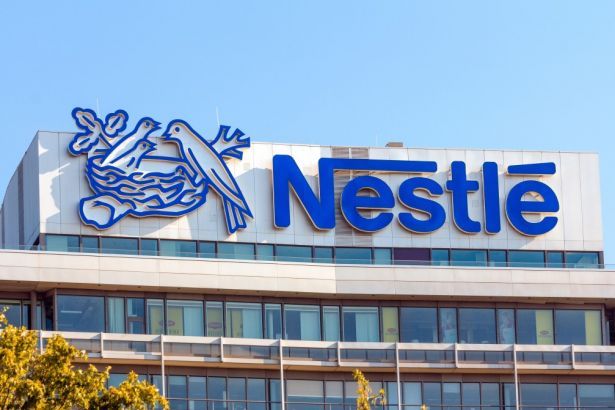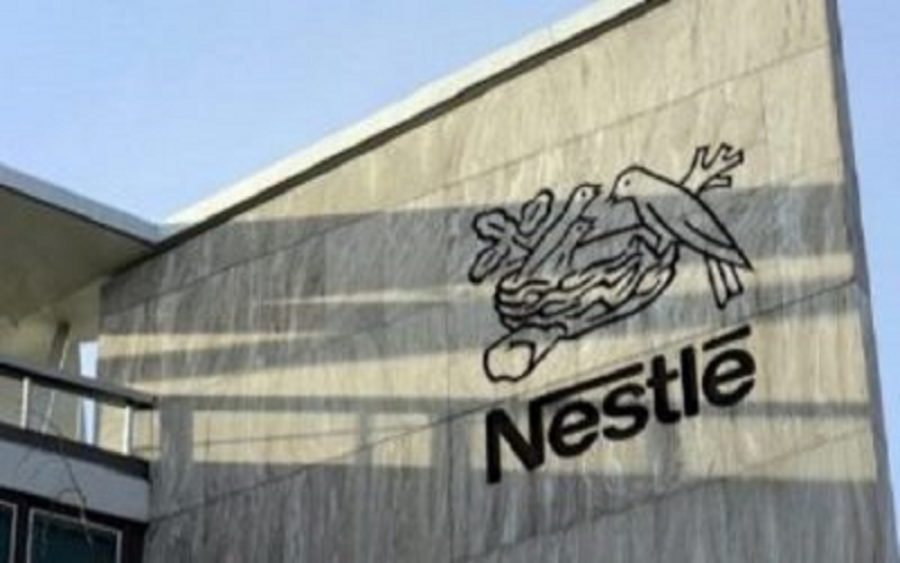Economy
Stock Analysis: Nestle Nigeria Q1-18 EPS Behind Expectation; SELL

By Cordros Research
Nestle Nigeria Plc recently published Q1-18 result showing EPS grew by a marginal 3% y/y to NGN10.86, which is behind what the market expects for the period by 15%.
Compared to our estimate, the achieved EBIT was short by 1% while EPS missed by 25%, owing to significant variation (-161%) on the net finance cost line.
In-line revenue; 2018E estimate unchanged:
Q1-18 revenue grew by 10.3%, consistent with our 10% growth estimate for the period. Annualized, the achieved revenue is behind market expectation by only 2%. A 15% q/q revenue growth suggests volume recovered strongly from the slack in the Oct-Dec period of last year, although we estimate volume may have grown at low single digit relative to Q1-17. Food revenue grew by 7% y/y while Beverages –benefiting from a low base volume in our view – grew by a bigger 17% y/y.
Compared to Q4-17, both segments recorded 16% and 11% top-line growth respectively. Thus far from our routine checks, prices have been stable for most of NESTLE’s products compared with end-2017 levels, and although early – but we observed the gradually reducing on-the-shelve prices of consumer products across major outlets – reemphasizes our view on volume-led growth in 2018.
Our 10% revenue growth estimate for 2018E is unchanged.
Low Q1 gross margin; forming a trend?
Gross margin of 38.2% was achieved in Q1-18, slightly below the 39% we estimated for the period. Gross margin in Q1-17 was equally low (at least compared to Q4-16’s 45%) at 38.4%, before recovering to 42% average between Q2-Q4 of 2017.
We retain our 42% gross estimate for 2018E (vs. 41% in 2017FY), suggesting we expect recovery in subsequent quarters. Our estimate is in sync with the 41% gross margin the company had achieved historically before the bump to 45% in 2015FY. The major risks to our gross margin estimate are (1) lower selling price and (2) the increase we have observed thus far this year in the price of local maize. Although the risks are tempered by the (1) relatively lesser competition, given the strong loyalty that NESTLE’s brands enjoy, (2) stable and even improving currency exchange rate, and (3) softer prices of other raw material inputs such as sorghum, sugar, and dairy.
Q1-18 EBIT margin was lower by 8 bps y/y, driven majorly by the lower gross margin, and also because opex as a ratio of revenue only declined by a marginal 14 bps. We have 23% EBIT margin in our model for 2018E (the same 23% EBIT margin as in 2017FY), while noting that upside risks are almost the same as downsides.
Surprisingly high finance costs risk earnings growing below expectation:
The interest expense of NGN521 million (5% y/y and 158% q/q) and FX loss of NGN639 million (-38% y/y and 3118% q/q) reported in Q1-18 are both high in our view, considering NESTLE’s much reduced borrowings and the stable FX. We have consequently revised our finance cost estimate for 2018E higher by 105%, given that the amount reported in Q1 alone is more than half our prior estimate for the year. We should note that the expectation of a much lower finance cost carries significant weight both in our view, and the market’s of NESTLE’s earnings growth in 2018E. Gross loans as at end-march was NGN18.11 billion (vs. NGN48.7 billion in Mar, 2017 and NGN24.2 billion in Dec. 2017), the lowest since 2009FY.
Earnings estimate and valuation:
Compared to our previous estimate, we revise 2018E net profit lower by 6% to reflect the changes on the net finance cost line. On 2017FY results, our revised net profit estimate is higher by 37% (previously 46%). On our revised estimates, we have a DCF-based TP of NGN851.48 (previously NGN851.92) for NESTLE and maintain SELL rating. The stock is trading at forward (2018E) P/E and EV/EBITDA multiples of 27.4x and 18.3x respectively, at premium to Middle East and Africa peer averages of 18.7x and 12.4x.
Economy
LIRS Urges Taxpayers to File Annual Returns Ahead of Deadline

By Modupe Gbadeyanka
All individual taxpayers in Lagos State have been advised to file their annual tax returns ahead of the March 31 deadline.
This appeal was made by the Lagos State Internal Revenue Service (LIRS) in a statement issued by its Head of Corporate Communications, Mrs Monsurat Amasa-Oyelude.
The notice quoted the chairman of LIRS, Mr Ayodele Subair, as saying that timely filing remains both a constitutional and statutory obligation as well as a civic responsibility.
The statutory filing requirement applies to all taxable persons, including self-employed individuals, business owners, professionals, persons in the informal sector, and employees under the Pay-As-You-Earn (PAYE) scheme.
In accordance with Section 24(f) of the 1999 Constitution of the Federal Republic of Nigeria, Sections 13 &14(3) of the Nigeria Tax Administration Act 2025 (NTAA), every individual with taxable income is required to submit a true and correct return of total income from all sources for the preceding year (January 1 to December 31, 2025) within 90 days of the commencement of a new assessment year.
“Filing of annual tax returns is not optional. It is a legal requirement under the Nigeria Tax Administration Act 2025. We encourage all Lagos residents earning taxable income to file early and accurately.
“Early and accurate filing not only ensures full adherence with statutory requirements, but supports effective monitoring and forecasting, which are critical to Lagos State’s fiscal planning and long-term sustainability,” Mr Subair stated.
He further noted that failure to file returns by the statutory deadline attracts administrative penalties, interest, and other enforcement measures as prescribed by law.
To enhance convenience and efficiency, all individual tax returns must be submitted electronically via the LIRS eTax portal at https://etax.lirs.net. The platform enables taxpayers to register, file returns, upload supporting documents, and manage their tax profiles securely from anywhere.
In keeping with global best practices, Mr Subair reiterated that LIRS continues to prioritise digital tax administration and taxpayer support services. He affirmed that the LIRS eTax platform is secure and accessible worldwide. Taxpayers requiring assistance may visit any of the LIRS offices or other channels.
Economy
NNPC Targets 230% LPG Supply Surge to 5MTPA Under Gas Master Plan 2026

By Adedapo Adesanya
The Nigerian National Petroleum Company (NNPC) Limited has said the Gas Master Plan 2026 targets over 230 per cent scale-up of Liquefied Petroleum Gas (LPG) supply from 1.5 million tonnes per annum (MTPA) to 5 MTPA this year.
The Executive Vice President for Gas, Power and New Energy at NNPC, Mr Olalekan Ogunleye, unveiled the strategic direction of the NNPC Gas Master Plan 2026, outlining an aggressive expansion drive to position Nigeria as a regional and global gas powerhouse.
Mr Ogunleye delivered the keynote address at the 2026 Lagos Energy Week, organised by the Society of Petroleum Engineers (SPE), where he detailed plans to accelerate gas development, deepen infrastructure and significantly scale domestic supply.
According to him, the Gas Master Plan targets a scale-up of LPG or cooking gas supply from 1.5 MTPA to 5 MTPA, alongside expanded feedstock for Mini-LNG and Compressed Natural Gas (CNG) projects.
“The NNPC Gas Master Plan 2026 is a blueprint to unlock Nigeria’s vast gas potential and translate it into tangible economic value,” Mr Ogunleye said.
He added that the strategy would also drive exponential growth in Gas-Based Industries, GBIs, strengthening local manufacturing, fertiliser production and power generation.
“Our renewed focus is on turning abundant gas resources into inclusive economic growth and improved quality of life for Nigerians,” he stated.
Mr Ogunleye said the plan aligns with the Federal Government’s Decade of Gas initiative and the presidential production targets of achieving 10 billion cubic feet per day by 2027 and 12 BCF/D by 2030.
Industry leaders at the event, including executives from Chevron Corporation, Esso Exploration and Production Nigeria Limited, Midwestern Oil and Gas Company Limited, Abuja Gas Processing Company and Shell Nigeria Gas, commended the plan and praised Ogunleye’s leadership in driving implementation excellence.
The new blueprint signals NNPC’s determination to anchor Nigeria’s energy transition on gas, leveraging infrastructure expansion and domestic utilisation to consolidate the country’s status as Africa’s largest gas reserve holder.
Economy
Shettima Blames CBN’s FX Intervention for Naira Depreciation

By Adedapo Adesanya
Vice President Kashim Shettima has attributed the Naira’s recent depreciation to the intervention of the Central Bank of Nigeria (CBN) in the foreign exchange (FX) market, stating that the currency could have strengthened to around N1,000 per Dollar within weeks if the apex bank had allowed market forces to prevail.
The local currency has dropped over N8.37 on the Dollar in the last week, as it closed at N1,355.37/$1 on Tuesday at the Nigerian Autonomous Foreign Exchange Market (NAFEM), after it went on a spree late last month and into the early weeks of February.
However, speaking on Tuesday at the Progressive Governors’ Forum (PGF), Renewed Hope Ambassadors Strategic Summit in Abuja, the Nigerian VP said the intervention was to ensure stability.
“In fact, if not for the interventions by the Central Bank of Nigeria yesterday, the 1,000 Naira to a Dollar we are going to attain in weeks, not in months. But for the purpose of market stability, the CBN generously intervened yesterday.
“So, for some of my friends, especially one of our party leaders who takes delight in stockpiling dollars, it is a wake-up call,” the vice president said.
He was alluding to CBN buying US Dollars from the market to slow down the rapid rise of the Naira.
Latest information showed that last week, the apex bank bought about $189.80 million to reduce excess Dollar supply and control how fast the Naira was gaining value.
The move was aimed at preventing foreign portfolio investors from exiting Nigeria’s fixed-income market, as large-scale sell-offs could heighten demand for US Dollars, intensify capital flight, and exert further pressure on the exchange rate.
Amid this, speaking after the 304th meeting of the monetary policy committee (MPC) of the CBN on Tuesday, Governor of the central bank, Mr Yemi Cardoso, said Nigeria’s gross external reserves have risen to $50.45 billion, the highest level in 13 years.
This strengthens the country’s foreign exchange buffers, enhances the apex bank’s capacity to defend the Naira when needed, and boosts investor confidence in the stability of the Nigerian FX market.
-

 Feature/OPED6 years ago
Feature/OPED6 years agoDavos was Different this year
-
Travel/Tourism10 years ago
Lagos Seals Western Lodge Hotel In Ikorodu
-

 Showbiz3 years ago
Showbiz3 years agoEstranged Lover Releases Videos of Empress Njamah Bathing
-

 Banking8 years ago
Banking8 years agoSort Codes of GTBank Branches in Nigeria
-

 Economy3 years ago
Economy3 years agoSubsidy Removal: CNG at N130 Per Litre Cheaper Than Petrol—IPMAN
-

 Banking3 years ago
Banking3 years agoSort Codes of UBA Branches in Nigeria
-

 Banking3 years ago
Banking3 years agoFirst Bank Announces Planned Downtime
-

 Sports3 years ago
Sports3 years agoHighest Paid Nigerian Footballer – How Much Do Nigerian Footballers Earn



















